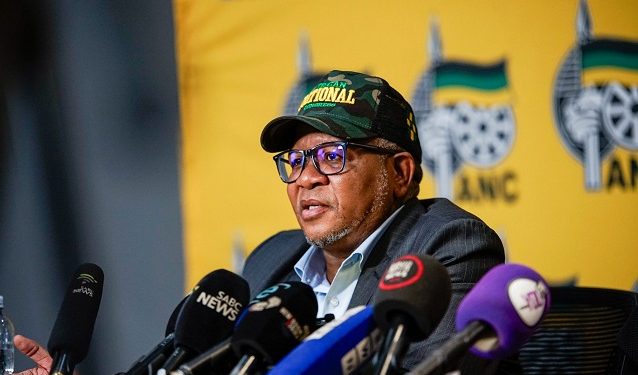Tensions within South Africa’s governing African National Congress (ANC) have intensified as party MPs openly revolt against Secretary-General Fikile Mbalula, calling for the immediate removal of the Democratic Alliance (DA) from the fragile Government of National Unity (GNU). The demands follow months of growing policy disagreements, public disputes, and accusations that the DA is obstructing the ANC’s agenda while using its coalition position to push neoliberal policies.
The GNU was formed after the ANC lost its parliamentary majority in the 2024 elections, initially aiming to ensure stable governance through cooperation with opposition parties, including the DA, Inkatha Freedom Party (IFP), and others. However, the alliance has been strained by ideological conflicts, particularly between the ANC and DA, which have clashed over economic policies such as the abandoned VAT increase and the National Health Insurance Act.
ANC MPs claim the DA’s recent actions—including voting against the fiscal framework and challenging ANC tax policies in court—have broken trust. “The DA joined this coalition to sabotage, not to work with us. They are exploiting their role to weaken our mandate,” said an unnamed ANC MP, echoing widespread frustration within the party.
The DA’s refusal to support the ANC’s 2025 budget, along with its successful legal bid to block a 0.5% VAT hike, has deepened resentment. Finance Minister Enoch Godongwana’s reversal on the tax increase, seen as a surrender to DA pressure, angered ANC lawmakers who view it as a betrayal of working-class voters.
“The DA pretends to defend the poor, but their policies favor corporations. We can’t govern with a party that imposes terms through lawsuits,” another ANC MP said.
The backlash grew after Mbalula publicly challenged the DA to “file divorce papers” if it could not align with the GNU’s principles, accusing the party of prioritizing politics over governance. However, his stance has drawn criticism from ANC MPs who argue that keeping the DA in the coalition risks alienating the party’s base and further destabilizing the government.
The South African Communist Party (SACP), an ANC ally, has condemned the GNU as an “elite pact” and accused the ANC of betraying its principles by collaborating with “anti-revolutionary forces.” This view is shared by many grassroots ANC members, particularly in provinces like North West, where frustration over coalition compromises has led to threats of election boycotts.
Despite the pressure, Mbalula has resisted immediate action against the DA, stressing the GNU’s role in preventing a constitutional crisis. “We remain committed to collective governance, but integrity must be upheld,” he reiterated recently.
Analysts warn that expelling the DA could collapse the government, forcing the ANC to rely on smaller parties or face a no-confidence motion—a scenario the Economic Freedom Fighters (EFF) has threatened to exploit.
With the ANC’s national executive committee meeting this week, pressure is mounting for a decisive response. While Mbalula favors further negotiations, MPs insist the DA’s confrontational approach justifies its removal. “The DA doesn’t want unity—it wants to control the state,” a senior ANC figure said.
As South Africa’s political crisis deepens, the ANC faces a critical decision: preserve a strained coalition or reclaim its independence at the risk of governance deadlock.






















